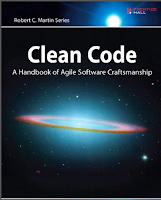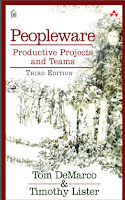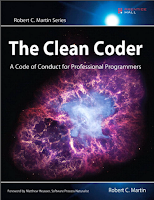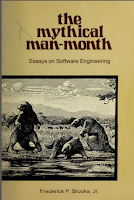1. Clean Code - A Handbook of Agile Software Craftmanship
The mission of this series is to improve the state of the art of software craftsmanship. The books in this series are technical, pragmatic, and substantial. The authors are highly experienced craftsmen and professionals dedicated to writing about what actually works in practice, as opposed to what might work in theory. You will read about what the author has done, not what he thinks you should do. If the book is about programming, there will be lots of code. If the book is about managing, there will be lots of case studies from real projects.
These are the books that all serious practitioners will have on their bookshelves. These are the books that will be remembered for making a difference and for guiding professionals to become true craftsman.
Click here to Download
If you don't know to download, click here
2. Code Complete 2nd Edition
The research and programming experience collected in this handbook will help you to create higher-quality software and to do your work more quickly and with fewer problems. This book will give you insight into why you’ve had problems in the past and will show you how to avoid problems in the future. The programming practices described here will help you keep big projects under control and help you maintain and modify software successfully as the demands of your projects change.
This handbook serves experienced programmers who want a comprehensive, easy-touse guide to software development. Because this book focuses on construction, the most familiar part of the software life cycle, it makes powerful software development techniques understandable to self-taught programmers as well as to programmers with formal training.
Click here to Download
3. Peopleware - Productive Projects and Teams
Peopleware in its first two editions made us a kind of clearinghouse for ideas about the human side of technology projects, and so our thinking has had to expand to keep up. New sections in this third edition treat some pathologies of leadership that hadn’t been judged pathological before, an evolving culture of meetings, hybrid teams made up of people from seemingly incompatible generations, and a growing awareness that, even now, some of our most common tools are more like anchors than propellers.
Click here to Download
4. The Clean Coder A Code of Conduct for Professional Programmers
Some technical books inspire and teach; some delight and amuse. Rarely does a technical book do all four of these things. Robert Martin’s always have for me and The Clean Coder is no exception. Read, learn, and live the lessons in this book and you can accurately call yourself a software professional.
The Clean Coder is much more than a set of rules or guidelines. It contains hardearned wisdom and knowledge that is normally obtained through many years of trial and error or by working as an apprentice to a master craftsman. If you call yourself a software professional, you need this book.
Click here to Download
5. The Mythical Man-Month - Essays on Software Engineering
The literature in this field is not abundant, but it is widely scattered. Hence I have tried to give references that will both illuminate particular points and guide the interested reader to other useful works. Many friends have read the manuscript and some have prepared extensive helpful comments; where these seemed valuable but did not fit the flow of the text, I have included them in the notes. Because this is a book of essays and not a text, all the references and notes have been banished to the end of the volume, and the reader is urged to ignore them on his first reading.
Click here to Download
6. The Pragmatic Programmer, From Journeyman To Master - Andrew Hunt, David Thomas - Addison Wesley - 1999
Straight from the programming trenches, The Pragmatic Programmer cuts through the increasing specialization and technicalities of modern software development to examine the core process--taking a requirement and producing working, maintainable code that delights its users. It covers topics ranging from personal responsibility and career development to architectural techniques for keeping your code flexible and easy to adapt and reuse. Read this book, and you’ll learn how to:
Fight software rot; Avoid the trap of duplicating knowledge; Write flexible, dynamic, and adaptable code; Avoid programming by coincidence; Bullet-proof your code with contracts, assertions, and exceptions; Capture real requirements; Test ruthlessly and effectively; Delight your users; Build teams of pragmatic programmers; and Make your developments more precise with automation.
Written as a series of self-contained sections and filled with entertaining anecdotes, thoughtful examples, and interesting analogies, The Pragmatic Programmer illustrates the best practices and major pitfalls of many different aspects of software development. Whether you’re a new coder, an experienced programmer, or a manager responsible for software projects, use these lessons daily, and you’ll quickly see improvements in personal productivity, accuracy, and job satisfaction. You’ll learn skills and develop habits and attitudes that form the foundation for long-term success in your career. You’ll become a Pragmatic Programmer.
Click here to Download
7. Working Effectively with Legacy Code (Robert C. Martin Series)
Legacy code. The phrase strikes disgust in the hearts of programmers. It conjures images of slogging through a murky swamp of tangled undergrowth with leaches beneath and stinging flies above. It conjures odors of murk, slime, stagnancy, and offal. Although our first joy of programming may have been intense, the misery of dealing with legacy code is often sufficient to extinguish that flame.
That’s what this book is about. It’s about reversing the rot. It’s about taking a tangled, opaque, convoluted system and slowly, gradually, piece by piece, step by step, turning it into a simple, nicely structured, well-designed system. It’s about reversing entropy. Rather, this book describes a set of disciplines, concepts, and attitudes that you will carry with you for the rest of your career and that will help you to turn systems that gradually degrade into systems that gradually improve.
Click here to Download











Tidak ada komentar:
Posting Komentar